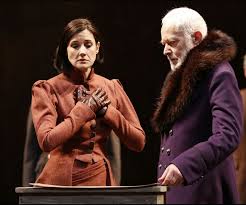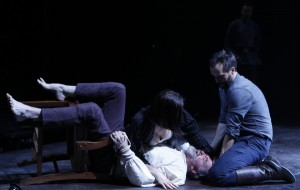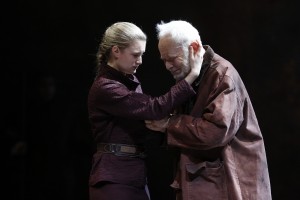“If I had written King Lear,” writes Fernando Pessoa via the semi-heteronym Bernando Soares, “I would be plagued by remorse for the rest of my life.” He gets at least one thing right: it’s a play that keeps coming after you. If it does not get you one way, it will another.
I saw the new Theatre for a New Audience production in Brooklyn last Thursday, directed by Arin Arbus and starring Michael Pennington. Perhaps to match the intimate space of Tfana’s new home, the Polonsky Shakespeare Center, the production pitched this massive tragedy toward the smaller, more domestic scale, as Ben Brantley noted a little while back in the Times.
It lacked some of the high-tragic rage and politics, as Stuart Elden notes, but I have never seen a production of Lear with better performances by women.
The start of the show, unlikely as it may seem, was Bianca Amato as Regan. When the middle daughter stepped forward to follow her sister Goneril, who was played very powerfully by Rachel Pickup, they two of them pinned their father to the floor. Regan’s speech, like her sister’s, was glib, oily, and rhetorical, but it was a performance of terrific power. When she looked at the king and insisted that she was made of “that selfsame metal as my sister is,” she got him. “Only,” she continued, twisting the knife, “she comes too short.” Regan in the end pronounced herself “alone felicitate / In your dear Highness’ love.” The poor old guy never had a chance.
Hearing Amato transform this hollow speech into a brutally effective display of inter-familial cruelty was one of the high points of the evening.
Cordelia’s a trickier part, and although Lily Englert was stronger here than she had been as Hermia in Tfana’s debut production of Midsummer last fall, I’m still waiting for a Cordelia to be as powerful as either of the other sisters in this production. Englert pouted well: the blank defiance of her “nothing” had me thinking of my own eleven-year old daughter and the almost-visible pressure of emotion just barely held in check. The opening scene’s tightly-wound domestic drama saw two supremely powerful daughters, squired around by the barely-adequate Albany and Cornwall, respond to being displaced in their father’s eye by an upstart younger sibling. That family story pushed aside all darker and broader purposes.
The other highlight of the show was the blinding of Gloucester (3.7), and again the heart of the scene revolved around the two elder sisters. It was in Goneril’s words that the idea of blinding the Earl first entered the scene, but, as in the first scene, the two sisters engaged in competition. Regan asked that Cornwall, “Hang him instantly,” to which her not-to-be-outdone sister added, “Pluck out his eyes.” But it was in the face of Regan’s insistence later in the scene that Gloucester admitted he sent the mad king to Dover: “Because I would not see thy cruel nails / Pluck out his poor old eyes.” Cornwall squeezed the jelly, but the sisters set the scene. The blinding itself saw Gloucester inverted on a chair, trying frantically to scoot himself offstage while Saxon Palmer’s Cornwall burst the blood-capsules and Regan looked on in ecstasy.
Nothing really topped that moment for me. Pennington’s King was most emotionally moving when entangled with his intransigent youngest daughter, and most revealingly clueless when assailing his eldest. In my newly Regan-centric reading of the play, I noticed that he cursed Goneril but did not tangle much with the middle sister. The final falls through the play’s trap-door structure, from the Howls to the Nevers to the feather which might or might not move, were potent but not painful. Shall I confess that I started to lose focus when Regan pronounced herself, “Sick, O sick”?
The bulk of the male cast was not able to match the sisters or even the father. Jake Horowitz’s shallow Fool was the weakest of the bunch, though I can’t really say many good things about Chandler Williams’s relatively bland Edmund or Jacob Fishel’s only slightly better Edgar. Christopher McCann’s Gloucester had a dapper and courtly bounce to his step in the early scenes, duly ground of of him with the blood from his eye sockets.
I saw the show the night the world learned that Gabriel Garcia Marquez had died, and I spent the night with the whirling yet somehow joyous tragedies of Macondo spinning alongside the play. Regan and Goneril struggled with family curses and their needs for primacy like Ursula or Colonel Aureliano. Lear presided impotently over the wreckage of his family like the mad Jose Arcadio Buendia when he was at last tied to a tree in the yard. Family tragedies can become global in scope, Gabo’s masterpiece reminds us. In this Lear, only the women sounded the master’s voice.




[…] Steve Mentz has a nice piece on this production here, which especially praises the performances of Lear’s […]